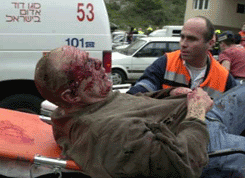|
|

|
|
|

|
Jewish World Review April 1, 2002 / 20 Nisan, 5762
EFRAT DIARIST
Late in the afternoon of Sunday, March 31, 2002, which this year was both
the fourth day of Passover and Easter Sunday, an explosion rocked Efrat, where I make my home on the West Bank.
My wife, typing away yet another e-mail to one of many corresponding women
from the world over, looked around the living room to see that the children
were OK, and promptly resumed her correspondence, including the boom in her closing
graph. Elchanon, our almost sixteen year old son who helps me in every
aspect of my work, ran to the scene of the blast, cell phone in hand. He stood
on a hill overlooking the evacuation of the wounded so that he could report
to me at the press center in Jerusalem, and to his brother, Noam, now a
soldier on the Lebanese front.
Elchanon's first words said it all. This attack was different from all the
other attacks. This time, an Arab blew himself up at the emergency mobile
medical unit that dispatched a medic to treat him.
As the terrorist blew himself up, the medic that responded,
Assaf Perlman, was riddled with shrapnel, sustaining injuries in his head
and chest. Assaf is fighting for his life. He is the same medic who
risked his life under fire at the Joseph Tomb compound in October 2000 to
try to save the life of a Druze (Arab) Israeli soldier, Mamduch Yusef, who wound
up bleeding to death in Assaf's arms. Five other paramedics were also hurt,
including Elchanon's tenth grade classmate, Netanel, whose parents,
Moshe and Debbie, are old friends of mine. We attended graduate school together
in New York 25 years ago and all settled in Efrat.
This attack was clearly aimed at our village's policy of
providing medical services for the two Arab villages that are
contiguous to it. As a matter of policy, the Rabbi of Efrat, Shlomo
Riskin, raised substantial funds from liberal Jews for medical clinics and
schools in these nearby Arab villages --- a policy that earned the wrath of
Arafat's Palestinian Authority.
Rabbi Riskin made such a policy decision in the spirit of the Torah, which states
36 times that when a non-Jew who lives at peace with you in the Land of
Israel, he must be treated with dignity, respect and service.
In January, and without warning, Moscow's Channel One filmed the
Arab villages near us, expecting to hear stories about the "Israeli
occupation" and tensions between the small Arab village and the 16
expanding Israeli Jewish settlements of Efrat and the Etzion Bloc. The
Russian TV crew heard the opposite message --- only praise for the Jews there, and seething anger against Arafat and the "PLO
occupation" of their fellow Palestinian Arab brethren in the Bethlehem region.
Family after family in these Arab villages told Russian TV that they were
receiving the best medical treatment possible from their Jewish friends in Efrat,
while their families in Bethlehem had to bribe officials just to get the
basics of treatment from the PA. They also spoke with pride about the
school we had built for them.
All this was aired on Russian TV Channel One very recently.
It would seem that the PA was watching. The clear purpose of the attack was
to disrupt a proper relationship between a Jewish city and an Arab village.
Despite the threats to their lives from Arafat and the Palestinian
Authority, the people of Efrat's nearby Arab villages gathered in an
emergency town meeting to issue a statement that denounced the attack in
the strongest of terms. It surprised nobody in the villages to learn that Arafat's
police force took credit for the attacks.
'Good neighbors'
til the very end
http://www.jewishworldreview.com |
March 31, 2002: On the fourth day of Passover: Why was the Arab suicide
attack in Efrat different from all other suicide attacks? Because it was
directed against the medical services that Arabs receive from private Jewish funds.
JWR contributor David Bedein is Bureau Chief of the Israel Resource News Agency. Comment by clicking here.
